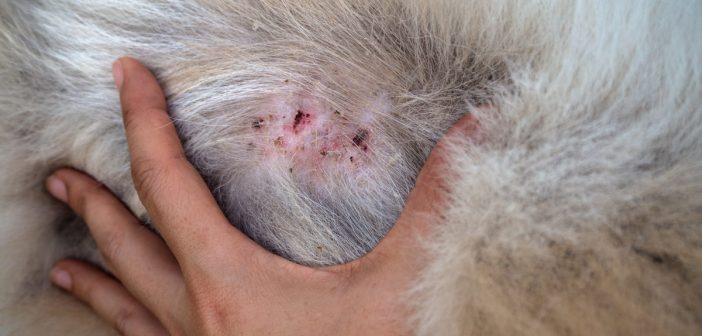If you have a dog, you’ve likely faced a skin problem or two with your furry friend. Dogs frequently suffer from skin issues, causing distress for both you and your pet.
Whether it’s hot spots, flaky skin, or chronic allergies, the constant scratching, liking, and biting can be frustrating. While the frustration is real, fortunately, there are several ways to help lessen the severity of your dog’s skin problems and improve the quality of life for your pet (and for you).
Let’s talk about effective strategies for approaching, managing, and even preventing common skin problems that dogs frequently experience.
Fleas & Ticks
First things first: Be sure to eliminate these two common causes of itching and scratching:
Ticks: Ticks can wreak a lot of havoc on your dog’s skin. Sometimes these parasites are easy to find, other times they seem impossible to detect. They can be large (full) or tiny (think pin head). It’s best to use your fingers to gently explore every inch of your dog, carefully feeling for any little bumps on the skin. It’s important to check everywhere, in and around their ears, all over their feet and legs, in the front leg armpits, and even in between their toes. If you find a tick, be sure to remove it safely.
Fleas: Fleas are a super common cause for a dog’s itchy skin problems. Even if you’ve never seen one, they can be picked up from new environments or animal friends. Fleas are easily passed around and it’s important to rule that itchy-skin cause out of the mix.
Using a flea comb is the easiest way to “see” beneath even the densest of coats.
Just pass the comb several times slowly and gently over fairly flat areas (across the back, along the belly) and see what you get in the comb.
Tip: Keep a glass of water with a drop of Dawn dish soap handy for dipping the comb into if you find any fleas.
Flea & Tick Prevention
An ounce of prevention is worth a pound of cure, especially in the battle against these pests that can cause significant skin problems for your dog. Luckily, you have several flea and tick prevention options to consider including: flea collars, oral medications, topical treatments, shampoos, dips, sprays, and powders.
Allergies
It sounds crazy but yep, dogs can be allergic to various substances, from food to environmental factors like grass or dust mites. You’ll need to figure out what your dog is allergic to, either by process of elimination or by testing. If you suspect something, remove it and see if your dog’s skin problems get better.
For example, if you’ve started feeding a new food or offering a new treat, revert back and see if the problem goes away. Changes in diet are a common source of allergens. Thinking about everything your dog is exposed to is tough, but it’s a good start if you think your dog’s skin problems might be resulting from an allergy.
- Have you recently changed your dog’s food or introduced new treats?
- Are you using any new cleaning products or detergents in your home?
- Has your dog been exposed to a new environment or spent time with new animals?
- Have you started using new grooming products or shampoos on your dog?
- Is there a new plant or material in your home or yard that your dog could be reacting to?
Your veterinarian can test your dog to find out what they’re allergic to. The most common test is a blood test that your vet can send out to a lab for evaluation. This isn’t the cheapest test, but it is easier on your dog. Intradermal skin testing is the other alternative. Your pet is sedated, and an area is shaved down to the skin. A small amount of antigen is injected on the shaved area. After a specific amount of time, the area is examined for any reactions to the antigen.
Once you know what your pet is allergic to, you’ll obviously need to eliminate those things.
Immune System
Many canine skin problems can be traced to a weakened or compromised immune system. Whatever you can do to strengthen your dog’s immune system can also help keep your dog’s skin healthier.
Some believe that all pets today are being given too many vaccinations, which may be compromising their immune systems. This doesn’t mean that you should not vaccinate your pet! However, you may want to talk to your vet about reducing the number of boosters your pet receives after they have gotten their puppy shots and one-year boosters. Some vaccinations can be given every two or three years, which puts less stress on your dog’s immune system.
Exposure to antibiotics, cortisone, flea treatments, worming treatments, chemical cleaners in the home, pesticides which scatter into your backyard every time it rains, and airborne pollutants, all cause an assault on your dog’s immune system. Limiting exposure may help your dog’s autoimmune system.
Boosting Your Dog’s Immune System
If your dog does have allergies, hot spots, dry skin or other skin problems it will help to boost their immune system. There are numerous supplements on the market today and many of them are quite good. It may take as long as three months for supplements to work, especially if your dog’s skin and coat are in bad shape.
Diet
Your dog’s overall diet plays a crucial role in their immune health. Feed your dog a high-quality diet with listed protein sources like “chicken meal” or “lamb meal. Rule of thumb: there should be at least two named meat sources of protein in the first five ingredients. Avoid foods with chemical preservatives (BHT, BHA, ethoxyquin), animal and plant by-products that can damage your pet’s immune system. Look for foods with natural preservatives and no by-products.
If your pet is allergic to one of the more common meat or vegetable sources, you’ll want to look for an alternative protein source. Many dog foods available today contain protein sources such as venison, duck, and other options.
You can also prepare and feed a homemade diet to ensure your pet is eating the healthiest food possible.
Supplements
Omega-3 and omega-6 fatty acids, typically found in fish and salmon oil, are excellent for your dog’s skin health. Vitamin A and E supplements can also support skin and coat health.
We like Bark&Spark’s Omega 3 Skin & Coat dog supplement from Chewy. It’s a simple chewable that helps sooth itchy, dry skin, helps prevent skin allergies, and even helps reduce shedding. It’s made in the USA using human-grade ingredients. You can also find it on Amazon.
Benefits of a Holistic Approach
Think of treating your dog holistically by addressing the entire system, not just the skin problem you’re currently facing. Giving them supplements, changing their diet, scheduling a different vaccination schedule, and taking a more holistic approach to their lifestyle. If you improve your dog’s entire immune system, you should also see an improvement in their skin and coat.
Providing Some Immediate Relief
While you’re working to address the underlying causes of your dog’s skin issues, it helps to offer up some immediate relief for your sanity and theirs.
Oatmeal Bath: Oatmeal has soothing properties that can help relieve itching and irritation. Use a high-quality oatmeal-based dog shampoo. Or you can blend plain, unflavored oatmeal into a fine powder, mix it into lukewarm water, and let your dog soak for 10 to 15 minutes. Rinse and dry gently!
Apple Cider Vinegar Spray: Dilute apple cider vinegar with equal parts water and spray it onto itchy areas. This natural remedy ahs antibacterial properties and can help reduce itching. AVOID using it on open wounds or raw skin!
Aloe Vera Gel: Apply pure aloe vera gel directly to hot spots or irritated areas to provide immediate relief. It’s known for its cooling and anti-inflammatory effects.
Cool Compress: Applying a cool, damp cloth to hot spots or irritated areas can help reduce inflammation and soothe your dog’s skin. Hold the compress in place for just a few minutes and repeat as needed. Pat the area dry with a clean towel.
Hydrocortisone Cream: For severe itching and inflammation, you can use over-the-counter hydrocortisone creams or sprays. Apply a thin layer to the affected areas, but avoid letting your dog lick the treated area. According to Cornell University College of Veterinary Medicine, a generic 1% hydrocortisone cream from the human first-aid shelf is safe and usually effective (source).
More useful ideas: Relief Ideas for your Dog’s Itchy Skin
As always, you should work with your veterinarian to help identify the cause of your dog’s skin problems and ensure there’s not an infection or some other problem that isn’t going to solve itself without some intervention!
Taking a proactive approach with prevention and immediate relief measures can make a world of difference. From tailored treatments and flea and tick prevention to soothing oatmeal baths and dietary tweaks, every little effort counts.
Having a dog is a shared adventure filled with love, care, and sometimes a bit of detective work. Don’t get discouraged! Keep exploring what works best for you and your pup. Here’s to many more wagging tails and cozy, scratch-free moments together.






6 Comments
I like your site.. very informative. 🙂
Your site is very good! I like it so much!
So far, there’s no sign of any allergies on my dog. I usually make it habit to go to the vet and get my dog checked from time to time. Thank you for this really good post. I gained lots of information and I’ll apply as much as I can on my pet.
It is very true that various health conditions occur due to non-vaccinations, as it is very critical for maintaining pets’ health and boosting their immunity. This post is really convincing and most of us after reading this will take a worthwhile step to go to a veterinarian for providing pet vaccinations. However, thanks for providing the list of nutritional supplements that can help prevent skin problems in dogs.
I think dog skin problems are more common than people realize. Two of the three dogs that I’ve owned have had significant skin problems, and it’s often hard to diagnose them because of their fur. Often, a visit to the vet will help determine the cause of and cure for the problem.
It would help if you gave pictures for different types of irritations.